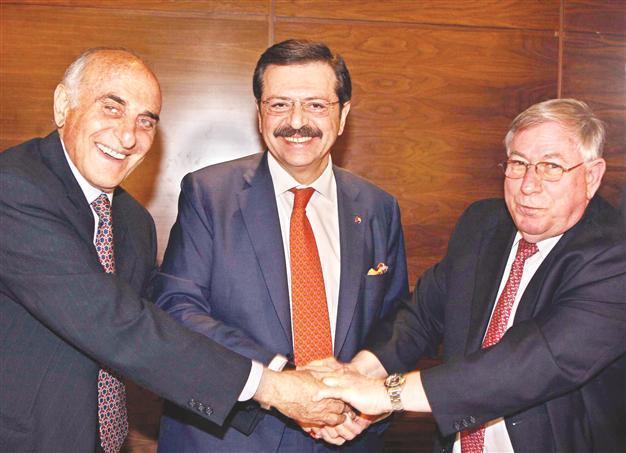Turkish chair takes offices at Middle East arbitration center
Erdal Sağlam JERUSALEM

International Chamber of Commerce’s (ICC) Palestine representative Munip El Masri (L), International representative Hisarcıklıoğlu (C) and Israel ICC Head Oren Shachor (R) signed the protocol to co-chair the Jerusalem Arbitration court which mediates commercial conflicts between Israel and Palestine. AA photo
Israeli and Palestinian businesspeople were delighted by the appointment of Turkey’s top business leader, Rıfat Hisarcıklıoğlu, as the chair of the Jerusalem Arbitration Center (JAC) founded by the International Chamber of Commerce (ICC). The start of the normalization process for Turkish-Israeli relations has boosted this optimism.
Hisarcıklıoğlu met with both Palestinian and Israeli businessmen on March 27 and then participated in the inauguration ceremony of the Jerusalem Arbitration Center protocol.
“I’m fully confident that the Jerusalem Arbitration Center will facilitate economic and commercial relations between Israel and Palestine more,” TOBB chairman Hisarcıklıoğlu said during the dinner after the protocol ceremony.
,
The Israeli and Palestinian National Committees of the ICC founded the JAC, a body that enables the resolution of conflicts caused by contracts in an efficient manner without going to court, in 2011.
Hisarcıklıoğlu, who heads Turkey’s Union of Chamber and Commodity Exchanges (TOBB), was selected as the international head of the arbitration court by the International ICC’s Israeli and Palestinian representatives in a consensus to mediate business-related disputes between the two parties.
Palestine’s ICC Head Munip El Masri said the initiative will have a positive effect on relations between the two countries, while Israel ICC Head Oren Shachor said that he believes the Arbitration Court will serve as bridge for the peace process.
Throughout the two-day contacts, it was clear the business leaders on both sides had substantial confidence in Hisarcıklıoğlu.
The meeting had already been scheduled but gained heightened significance in the wake of Israel’s apology to Turkey over the Mavi Marmara incident. The beginning of the normalization process of relations between the two countries was said to have delighted businesspeople. Turkey, represented by TOBB chairman Hisarcıklıoğlu and his team, had been putting in considerable efforts to encourage businesspeople on both sides to act together and it is apparent that these efforts and close contacts have yielded a renewed trust. Recovering relations between Turkey and Israel means new business opportunities for both parties’ business representatives.
Peace and businesspeopleHisarcıklıoğlu’s former deputy chairmanship of the ICC board played a great role in the Israeli and Palestinian ICC representatives’ decision to select him as the co-chair of the JAC.
Hisarcıklıoğlu has particularly emphasized the contribution of businesspeople to the peace process through their activities.
The JAC initiative demonstrates Palestinian and Israeli businesspeople’s commitment to the prosperity of their people, he said. “I believe peace, commerce and wealth support each other. If there is peace, commerce is enabled. If there are peace and commerce, wealth will be there. Therefore, the business world is one the most important links in this chain.”
Hisarcıklıoğlu said there was a need for dialogue and that more platforms should be provided to enable people to work together and to understand each other better.
Free circulation needed
Israeli and Palestinian politicians should enable free circulation of goods and people as it is the key to a business-friendly environment, Turkey’s top businessman, Rifat Hisarcıklıoğlu, said during the ceremony where he officially accepted a position as co-chair of the Jerusalem Arbitration Center (JAC).
He praised the recent elimination of quotas and customs taxes between sides. TOBB head said, however, politicians should take a further step and enable the free mobility of goods and people, as free circulation is the key to business.
